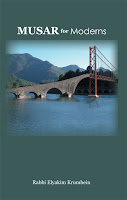
 Here is my article in this week's The Jewish Press (link):
Here is my article in this week's The Jewish Press (link):
Mussar Without Yelling
There are two types of people in the world - those who are inspired by Mussar and those who are turned off by it.
Mussar is a school of study that teaches religious self-improvement. Traditional Mussar, as practiced in many yeshivas to this day, has a rabbi exhorting his listeners, often yelling at them, to be more careful in their actions and attitudes. This is frequently accompanied with a Torah insight and maybe even a good parable. But it can be scary: fire, brimstone, judgment day - all the horrible implications of religious failure, in graphic detail.
For some people, this is just too much. It is too far detached from the joyous and uplifting religion with which they are familiar...
Click here to read moreFor some people, this is just too much. It is too far detached from the joyous and uplifting religion with which they are familiar.
Additionally, Mussar can feel burdensome. It requires constant self-evaluation and self-criticism. Some people can find this too disruptive of their daily routine. The abnormally strict and antisocial behavior that Mussar can seem to require might be possible within the confines of a yeshiva atmosphere, but in the business world, or even in the midst of a busy family, it is quite difficult to sustain.
Others find Mussar to be depressing. As it is, it takes all of their effort to muster the self-confidence to face their daily challenges and now they have undermine it with biting self-criticism. Do they really want to hear, when they cannot meet the high standards set for them, that they are religious failures?
Not everyone feels this way. Some find Mussar enriching, in that it inspires them to think hard about their priorities in life. They enjoy the wake-up call from impassioned speakers and find the discipline and self-awareness that Mussar demands to be liberating. Recognizing this, some educators have asked how these benefits of Mussar can be transmitted to those who find the traditional Mussar approach to be off-putting.
If you can't fit a square student into the circle of traditional Mussar, perhaps Mussar can be transformed so that the benefits can be enjoyed by different types of people. Two fairly recent books answer this question in different ways.
Musar for Moderns (Ktav, 2005), by Rabbi Elyakim Krumbein, tackles this issue straight on. Rabbi Krumbein, a rebbe at Yeshivat Har Etzion in Israel, presents a program for Mussar as it applies to Jews who are a part of today's society. How can we teach Mussar effectively to people who are constantly bombarded with information, advertisements and diversions - people living in an age of individualism and instant gratification? The message of total withdrawal from society does not resonate with most people.
This is not a Mussar book in the sense that it does not teach Mussar. Rather, it is an exploration of techniques and attitudes to help the prospective Mussar student and teacher apply the teachings effectively. Rabbi Krumbein does not advocate total withdrawal from society; he understands that expectations must be realistic. On the other hand, he does not pretend that religious self-improvement is easy. Confronting your flaws is supposed to be difficult and overcoming them is supposed to be challenging.
What he does is address techniques of becoming a better Jew that are relevant to people exposed to contemporary society, which realistically is just about everyone. Deconstructing the approaches of Rav Yisrael Salanter, Rav Yosef Horowitz of Novardok, Rav Yosef Leib Bloch of Telz and others, Rabbi Krumbein creates a toolbox of techniques from which the contemporary student can select, as appropriate to the individual situation. He explores different attitudes to materialism and how it affects us both positively and negatively. And, recognizing the difficulties of withdrawal from our peers, he devotes three chapters to a discussion of appropriate attitudes to "being normal."
In an entirely different way, Rabbi Yaakov Feldman shows us how to "do" Mussar more subtly in his translation of and commentary on The Eight Chapters of the Rambam (Targum, 2008).
Like his translations of other Mussar classics - such The Path of the Just (Mesillas Yesharim), Duties of the Heart (Chovos HaLevavos) and Gates of Repentance (Sha'arei Teshuvah) - this English rendition is very accessible to the average reader. You don't need to read this with a dictionary next to you.
More important, each of the eight chapters is accompanied with an introduction and synopsis describing the goal of the chapter and how to apply it to your life. Additionally, the entire text has extensive footnotes in which, with great sensitivity and insight to human nature, Rabbi Feldman explains how the Rambam's ethical theories from eight hundred years ago apply very much to people today.
In a sense, what Rabbi Feldman is doing is rewriting the traditional Mussar literature in a more laid-back tone. He does not change the content but translates it into today's spoken language, which helps make it more palatable and applicable to someone with modern sensibilities. This is no small task and I am sure historians disapprove of his liberties with the text. The result, however, speaks to the person who shies away from the yelling of Mussar and prefers the soothing tones of instruction without intimidation.
There is always an appropriate fear among Orthodox Jews over tinkering with our tried-and-true educational methods. Sometimes, however, necessity must trump ideology. The importance cannot be overstated of educating our children to be people who are not only religiously observant but also religiously sensitive and thoughtful.
The tools Rabbis Krumbein and Feldman have given us will serve well many people who do not benefit from the traditional methods.
 8:52 PM
8:52 PM
 Gil Student
Gil Student